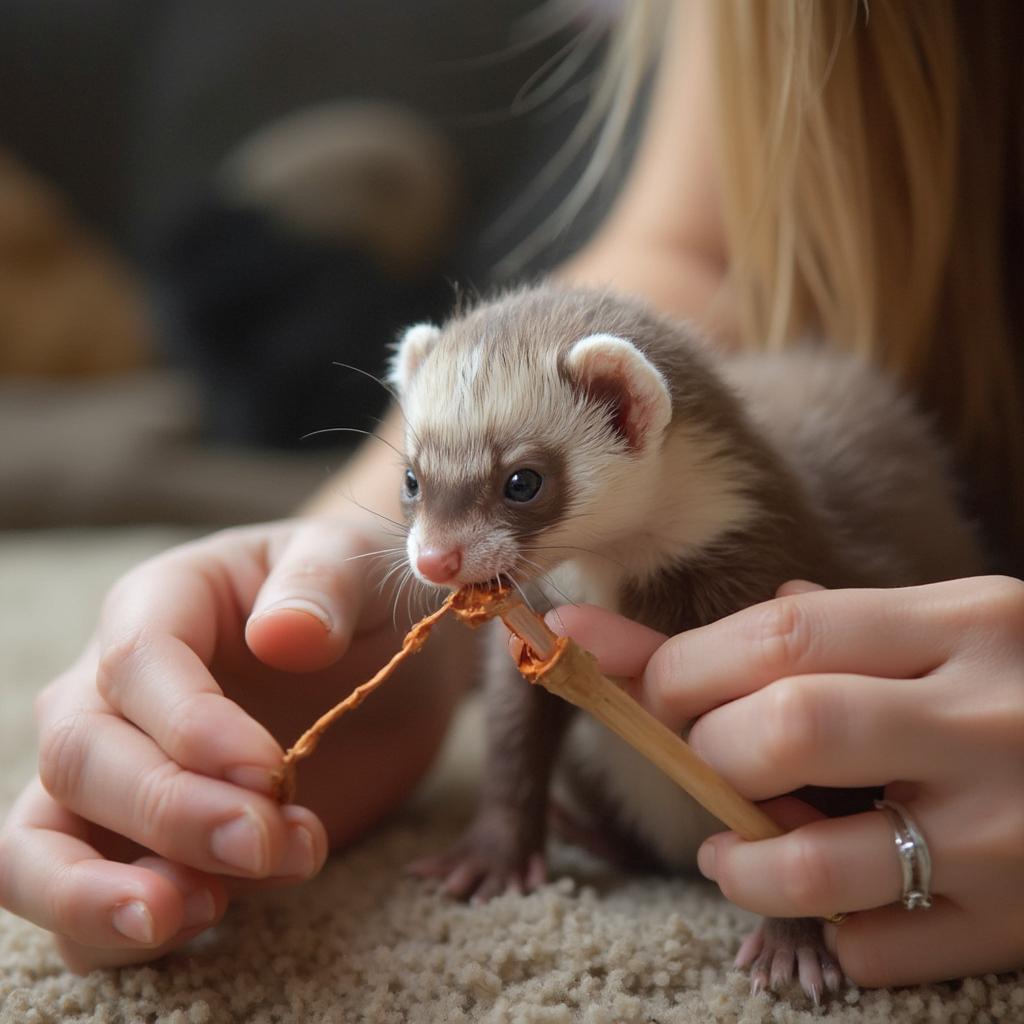Your cart is currently empty!

Baby Ferret Care Tips: A Comprehensive Guide
Baby ferret care requires diligence and understanding. This guide provides comprehensive information on how to care for your new furry friend, ensuring they thrive in their new home. From housing and nutrition to socialization and health, we’ll cover everything you need to know. Let’s dive into the world of baby ferret care!
Preparing for Your Baby Ferret’s Arrival
Before bringing your baby ferret, also known as a kit, home, it’s crucial to create a safe and stimulating environment. Baby ferrets are naturally curious and playful, so their space should reflect that. A spacious cage, appropriate bedding, food and water bowls, and plenty of toys are essential. Consider providing a designated area for them to relieve themselves, as ferrets can be litter-trained.
Ensuring your home is “ferret-proofed” is also vital. Ferrets are notorious for squeezing into small spaces and chewing on anything they can find. Secure any potential hazards, such as electrical cords and toxic substances. ferret care tips offers more insights into ferret-proofing your home.
Feeding Your Growing Kit
Nutrition plays a critical role in a baby ferret’s development. High-quality ferret food, rich in protein and fat, is recommended. Avoid sugary treats and foods intended for other pets. Fresh water should always be available, preferably in multiple locations and both in a bowl and a sipper bottle.
Baby ferrets have small stomachs and need to eat frequently. Offer small meals throughout the day to maintain their energy levels and support their rapid growth. Monitor their weight and adjust feeding portions as needed.
Socialization and Playtime
Baby ferrets are highly social animals and benefit from interaction with both humans and other ferrets. Introduce them to different sights, sounds, and smells early on to promote healthy socialization. Gentle handling and regular playtime are essential for building a strong bond.  Baby Ferret Playtime
Baby Ferret Playtime
Provide a variety of toys, such as tunnels, balls, and soft toys, to keep them entertained and mentally stimulated. Supervise their play sessions to ensure their safety and prevent destructive behavior.
Healthcare for Your Baby Ferret
Regular veterinary checkups are crucial for maintaining your baby ferret’s health. Vaccinations against distemper and rabies are typically recommended. Discuss with your veterinarian a suitable vaccination schedule and preventative measures for common ferret illnesses.
Observe your ferret’s behavior and look out for any signs of illness, such as lethargy, loss of appetite, or changes in stool. Prompt veterinary attention is essential if you notice any abnormalities.
“Early detection and preventative care are key to a long and healthy life for your ferret,” says Dr. Emily Carter, DVM, a leading exotic animal veterinarian.
Is it normal for baby ferrets to sleep a lot?
Yes, baby ferrets are known to sleep for extended periods, often up to 18 hours a day. This is normal and essential for their growth and development.
How can I tell if my baby ferret is dehydrated?
Signs of dehydration in a baby ferret include lethargy, dry gums, and sunken eyes. If you suspect your ferret is dehydrated, consult a veterinarian immediately.
Housing Multiple Baby Ferrets
If you plan on housing multiple baby ferrets, ensure they have ample space and resources to avoid competition. Introduce them gradually to prevent territorial disputes.
“Providing each ferret with their own space within the cage can minimize conflict and promote a harmonious environment,” advises Dr. Sarah Miller, a certified ferret behaviorist.
What should I do if my baby ferret bites me?
Baby ferrets may nip out of curiosity or playfulness. Discourage this behavior with a firm “no” and redirect their attention to a toy. 10 ferret care tips to enhance your ferret’s life petchapetcha provides additional tips on handling ferret bites.
Conclusion
Baby ferret care demands commitment, but the rewards of raising these playful and affectionate creatures are immeasurable. By following these Baby Ferret Care Tips, you can provide your kit with a happy, healthy, and enriching life. Remember, a well-cared-for ferret is a happy ferret.
FAQ
- What is the best age to bring a baby ferret home?
- How often should I clean my baby ferret’s cage?
- Can baby ferrets be litter-trained?
- What are some common health problems in baby ferrets?
- What should I do if my baby ferret escapes its cage?
- How can I introduce my baby ferret to other pets?
- What are the signs of a happy and healthy baby ferret?
For further support, don’t hesitate to contact us via WhatsApp: +1(641)206-8880, Email: [email protected] or visit our office at 456 Pine Avenue, Toronto, ON M5V 2J4, Canada. We have a 24/7 customer support team ready to assist you.

Leave a Reply